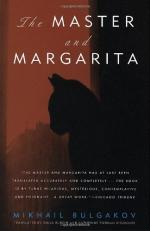|
This section contains 5,138 words (approx. 18 pages at 300 words per page) |

|
SOURCE: Schrewe, Ursula Reidel. “Key and Tripod in Mikhail Bulgakov's Master and Margarita.” Neophilologus 79, no. 2 (April 1995): 273-82.
In the essay which follows, Schrewe examines the significance of items which figure in both Goethe's Faust and Bulgakov's Master and Margarita.
The connection between Goethe's Faust and Bulgakov's Master and Margarita suggests itself in the title of the novel: The Master referring to Faust and Margarita referring to Margarete or Gretchen from the first part of Goethe's tragedy. Another obvious reference to Faust is the novel's epigraph; it quotes the famous dialogue between Mephistopheles and Faust when they first meet. Faust asks “Who art thou—then?” and Mephistopheles introduces himself as the “Part of that power which eternally wills evil and yet creates the good”. Granting the entire novel to be a comment on this quote, we are led to believe that Bulgakov adopted Goethe's concept of the devil as...
|
This section contains 5,138 words (approx. 18 pages at 300 words per page) |

|


